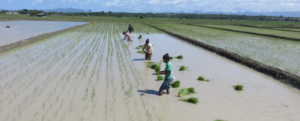Building Understanding
John Campbell-Nelson serves the Evangelical Christian Church of West Timor.
I have been spending a lot of time on my back porch lately, partly because of Covid isolation, partly because I’m semi-retired anyway, and mostly because it offers a beautiful view of the rice fields. This is planting season and the seedlings range in hue from chartreuse to deep green, depending on when they were planted. Our daughter in the US even asked us to send her a picture of the young seedlings, because it is a favorite color implanted in her childhood memory.

Two days ago, I happened to walk by the study area used by the three junior high students in our extended family. We have all pitched in to do home schooling—I do math and computer, Karen does English and typing, and several other women in our household handle the rest. They were having their Earth Science lesson and were asked to distinguish between natural and human-made environments. I pointed out to the rice fields and asked, “Which is that—natural, or human-made?” All three answered immediately, “Human-made!”
They were absolutely right. In “nature” it was originally a palm forest. About 70 years ago our village dammed a river to the east of the fields, dug irrigation channels, cut down the palm trees and burned out the stumps. My lovely green view—about the size of three or four 18-hole, very flat, golf courses—was there because of human labor. And in all those waves of grain, that sea of green, every single stalk was planted, one at a time, by human hands. My neighbors are out there now, eight in a row, their hands going up and down like the needle on a sewing machine, each “stitch” another rice plant. Millions, one by one.
They used to turn the soil for corn in the same way, all standing in a row, each holding a metal bar: up together, down together, pry loose the earth, take a step back, and repeat. There were rhythmic songs the farmers sang that made heavy work seem light. Thatching houses, threshing, preparing wedding and funeral feasts, and many other common tasks seemed to just happen with little need for talk—just the songs, interspersed with the inevitable jokes and gossip.

In my early years here, I got misty and romantic about it (and part of me still does), but it isn’t magic. It works because everybody has a part to play, they know their parts, and they have a common purpose and a common need. There is a grace to it all, both human and divine, but there is also sweat and mud.
This is all in stark contrast to our local response to Covid, which is utterly chaotic. Testing facilities are held up because of confusion about which government agencies are in charge of giving certification; hospitals are out of oxygen and the oxygen-producing machines have broken down. Masks are a formality, worn when public officials or pastors are around, but then pulled down off the nose or worn as a necklace as soon as the officials are gone. Social distancing may be practiced among strangers, but not with family and friends. People fear being tested, and many Covid deaths are only known after the fact. Families steal the corpses from the hospital in order to have a “proper” burial. Public figures are vaccinated in publicity events to show that vaccines are safe, but then no one knows where or how to get vaccinated.
Some of these scenes are probably happening in the US as well. My point is not to criticize anyone, but merely to draw the lesson from the contrast between how we work together in the rice fields and how we work together (or fail to do so) in response to the corona virus. To put it simply: what we are able to do together depends on what we understand together. People understand rice; they don’t understand Covid.
In response to this novel situation, the church’s ministry here has in many ways become a giant public education program. Pastoral letters keep people informed of basic safety procedures and new developments; new liturgies and “standard operating procedures” are published for how to safely worship, baptize, have communion, and of course, conduct funerals. Some pastors learn to use video calls for pastoral conversations and church council meetings, and Zoom seminars are constant companions. Our partner, GMIT, has provided remarkable leadership in all these efforts, as has the Oase Institute in Sulawesi, which sponsored Zoom-based international seminars featuring major Indonesian theologians reflecting on the meaning of Covid for our faith. All of these efforts promise to slowly build the common understanding that we need for common action.
As I reflect from across the ocean on the situation in the United States, it seems to me the problem is much the same: how to build a common understanding. Not just with Covid, but in the matter of how to be an American. The confusion of tongues at the tower of Babel was surely no worse than the epistemic chaos ravaging the US these days. Maybe we could start by learning to plant rice together.
John Campbell-Nelson serves the Evangelical Christian Church of West Timor. His appointment is made possible by your gifts to Disciples Mission Fund, Our Church’s Wider Mission, and your special gifts.

